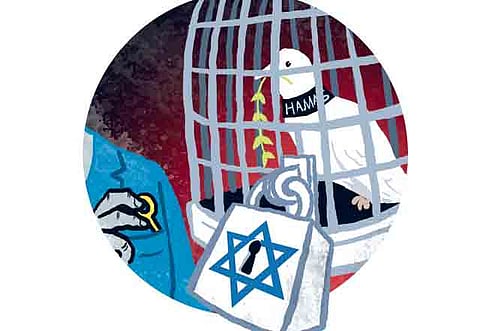A moderate Hamas terrifies Israel
The more pragmatic the resistance movement becomes, the more violently the Zionist state reacts

In the four years since it swept Palestinian parliamentary elections, Hamas has been struggling to win international recognition. It tried to strike a balance between its ideology as a resistance movement and its responsibilities as a governing authority in the Gaza Strip. Little success has been achieved.
After winning the 2006 elections, Hamas immediately began grappling with various conflicting pressures. The Israeli government, which evacuated Gaza in 2005, reacted strongly to Hamas' electoral victory. It imposed military, economic and diplomatic siege on Gaza, hoping to put an end to the rule of the movement. Meanwhile, the Quartet — the United States, the European Union, the United Nations and Russia — demanded that Hamas, in order to gain international legitimacy, commit to nonviolence, recognise Israel and accept previous agreements signed between Israel and the Palestinian National Authority. All the while, Hamas felt a domestic imperative to secure Palestinian national unity. In the face of these pressures, Hamas tried to walk a very fine line.
In early 2007, in an attempt to halt escalating intra-Palestinian bloodshed and secure international aid, Hamas agreed to share power with Fatah in a national unity government. It refused, however, to include in the government's platform any acceptance of the Quartet's conditions or of the 2002 Arab peace initiative, which proposed that Arab states normalise relations with Israel following a comprehensive settlement of the Arab-Israeli conflict. By June 2007, the national unity government had collapsed. Under the initiative of its more radical military wing, Hamas overran Gaza and established an independent political entity.
Split in two
The violent end of the unity government split the Palestinian territories into two entities — one in the West Bank, one in the Gaza Strip — with vastly different governments and political climates. In the West Bank, the Palestinian National Authority embarked on unprecedented hostile measures against Hamas, which included widespread arrests of its sympathisers, the discharging of Hamas preachers from mosques, and the seizure of Hamas funds. In Gaza, by contrast, Hamas initiated a gradual yet determined process of Islamisation in all spheres of life.
Yet, despite the hostility, since the seizure of Gaza, Hamas has adopted more pragmatic positions. It has been conducting intermittent national unity talks with Fatah — to no avail, however. It also reached out to the West, suggesting a dialogue with western governments. And some Hamas leaders expressed willingness to accept a long-term ceasefire with Israel if a Palestinian state were established along the 1967 borders.
Israel's response was to stifle this moderation. In December 2008, Israel launched Operation Cast Lead, a massive military offensive on Gaza. More than 1,300 Palestinians were killed and several thousands others were injured or made homeless. Israel's policy backfired. Since the attack on Gaza, Hamas has never missed an opportunity to prove to the rest of the world that it is becoming even more moderate.
In fact, since the brutal Israeli attack on Gaza, Hamas has been moving gradually but steadily to the centre of Palestinian politics. It, hence, abandoned its original position, publicly at least, which is committed to the destruction of the state of Israel and the establishment of a Palestinian national state on all of historic Palestine. It has also accepted a long-term truce with Israel within its 1967 boundaries. Hamas did not even rule out talking to Israel, but attached conditions to commencing such talks.
Hostile reaction
All this does not seem to please Israel. On the contrary, the more pragmatic Hamas grows, the more hostile Israel becomes. It seems that Israel is committed to the destruction of Hamas and preventing the emergence of an independent Palestinian state. After Hamas has implicitly accepted the Quartet's conditions, fairness requires that similar pressure should be put on Israel to accept the right of Hamas to exist, renounce violence against Palestinians, and recognise their right to a viable and independent state.
Dr Marwan Al Kabalan is a member of the Centre for Strategic Studies and Research at Damascus University in Syria.


